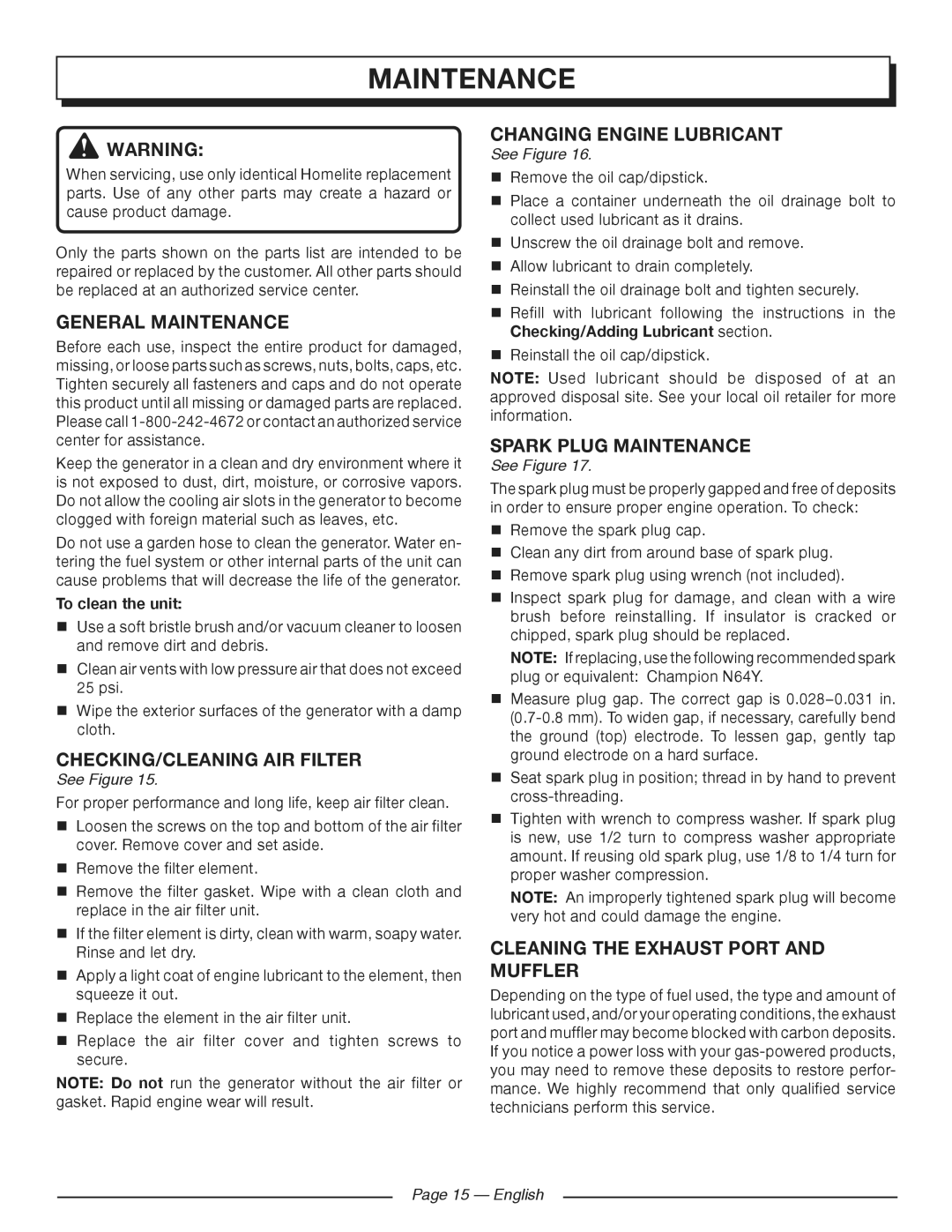
maintenance
![]() WARNING:
WARNING:
When servicing, use only identical Homelite replacement parts. Use of any other parts may create a hazard or cause product damage.
Only the parts shown on the parts list are intended to be repaired or replaced by the customer. All other parts should be replaced at an authorized service center.
GENERAL MAINTENANCE
Before each use, inspect the entire product for damaged, missing, or loose parts such as screws, nuts, bolts, caps, etc. Tighten securely all fasteners and caps and do not operate this product until all missing or damaged parts are replaced. Please call
Keep the generator in a clean and dry environment where it is not exposed to dust, dirt, moisture, or corrosive vapors. Do not allow the cooling air slots in the generator to become clogged with foreign material such as leaves, etc.
Do not use a garden hose to clean the generator. Water en- tering the fuel system or other internal parts of the unit can cause problems that will decrease the life of the generator.
To clean the unit:
Use a soft bristle brush and/or vacuum cleaner to loosen and remove dirt and debris.
Clean air vents with low pressure air that does not exceed 25 psi.
Wipe the exterior surfaces of the generator with a damp cloth.
checking/CLEANING AIR FILTER
See Figure 15.
For proper performance and long life, keep air filter clean.
Loosen the screws on the top and bottom of the air filter cover. Remove cover and set aside.
Remove the filter element.
Remove the filter gasket. Wipe with a clean cloth and replace in the air filter unit.
If the filter element is dirty, clean with warm, soapy water. Rinse and let dry.
Apply a light coat of engine lubricant to the element, then squeeze it out.
Replace the element in the air filter unit.
Replace the air filter cover and tighten screws to
secure .
NOTE: Do not run the generator without the air filter or gasket. Rapid engine wear will result.
changing engine lubricant
See Figure 16.
Remove the oil cap/dipstick.
Place a container underneath the oil drainage bolt to collect used lubricant as it drains.
Unscrew the oil drainage bolt and remove.
Allow lubricant to drain completely.
Reinstall the oil drainage bolt and tighten securely.
Refill with lubricant following the instructions in the
Checking/AddingLubricant section.
Reinstall the oil cap/dipstick.
Note: Used lubricant should be disposed of at an
approved disposal site. See your local oil retailer for more information.
spark plug maintenance
See Figure 17.
The spark plug must be properly gapped and free of deposits in order to ensure proper engine operation. To check:
Remove the spark plug cap.
Clean any dirt from around base of spark plug.
Remove spark plug using wrench (not included).
Inspect spark plug for damage, and clean with a wire brush before reinstalling. If insulator is cracked or chipped, spark plug should be replaced.
NOTE: If replacing, use the following recommended spark plug or equivalent: Champion N64Y.
Measure plug gap. The correct gap is 0.028−0.031 in.
Seat spark plug in position; thread in by hand to prevent
Tighten with wrench to compress washer. If spark plug is new, use 1/2 turn to compress washer appropriate amount. If reusing old spark plug, use 1/8 to 1/4 turn for proper washer compression.
NOTE: An improperly tightened spark plug will become very hot and could damage the engine.
CLEANING THE EXHAUST PORT AND MUFFLER
Depending on the type of fuel used, the type and amount of lubricant used, and/or your operating conditions, the exhaust port and muffler may become blocked with carbon deposits. If you notice a power loss with your
Page 15 — English
